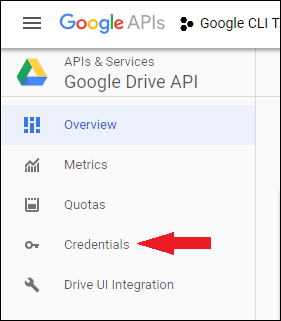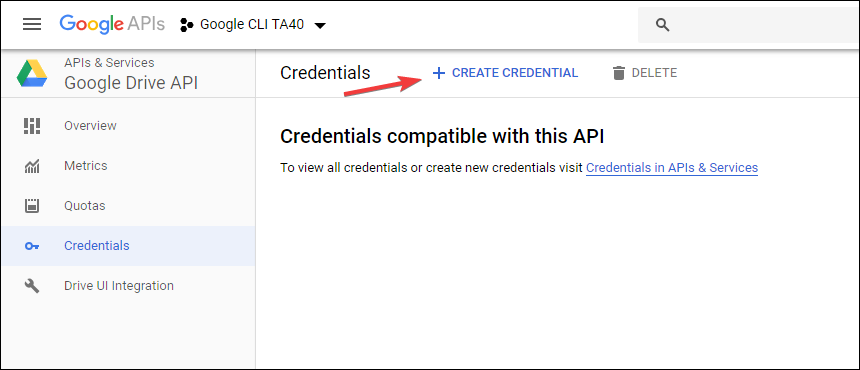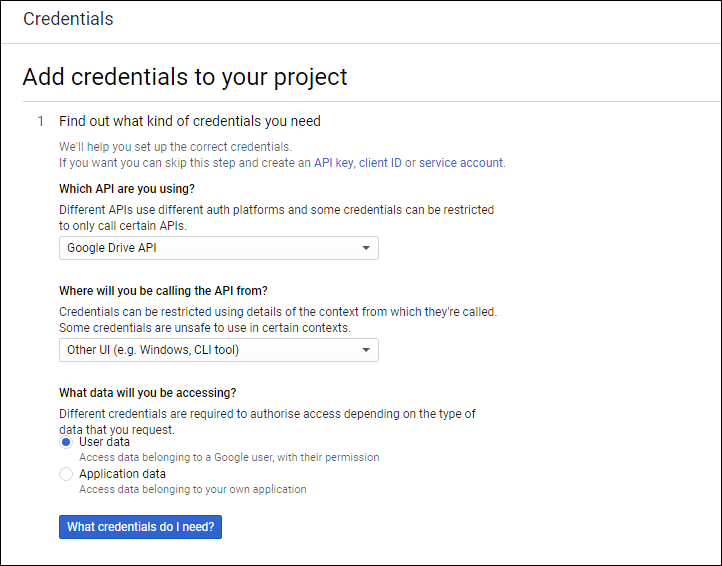-
Notifications
You must be signed in to change notification settings - Fork 1.2k
TUTORIAL: How to get rid of 403 Errors #426
Comments
|
Thanks for the tutorial. Closes #424 and #392. Should be included to the repo imo Also I think Client ID/Secret should be read from client_id.json directly instead of hard-coding and simply replacing that file would solve it. I might create a pull request but not sure if the repo is still maintained. |
|
Last update was a year ago, so yeah, I don't think so. But this step-by-step tutorial should be fine, if anything's missing, let me know |
|
TA40 isn't it possible to compile a linux amd64 version of this even if your doing it from golang installed on windows. Try to follow your steps and everything good so far, just need figure out the how to compile it and compile it for ubuntu 64bit, so amd64. Trying to do this from windows right now. If know if this possible and how maybe let me know and add to the guide? |
|
I don't know how to compile it for linux etc. |
|
yea been trying too google it myself but yea might be better install unbutu in vmware and go from there. Like never done much compiling etc so dont realy know what im doing. Tryd follow ur steps for windows compile but yes giving me errors like this atm: C:\Users\zibia\go\gdrive-master>go build |
|
After you've changed the token, running _release/build-all.sh on Linux (or bash on Windows) should build all versions defined in "PLATFORMS" variable. 2 prerequisites: |
execute |
|
Okay, I found it out.
will add this one to the guide, thanks |
|
Will give this a try and get back to you asap. |
|
Okay so based on all this info i manged to compile a working version for my Ubuntu server. Have tested it and confirmed its using the new API info i put inn and no more 404 errors. Thanks for putting this together TA40. But yea if someone knows how code this maybe next thing would be to move the google api Credentials to a config file rather than having them hard coded like this. Would be ideal for regular users so they don't have to compile it themselves. |
|
Nice, good to know that it's working. Anything to add to the tutorial where you had problems or so? |
|
Well nothing big but i installed golang first then git, newly reinstalled windows so didn't have it and you will need to restart your computer for GIT to work in golang so maybe add that. But yea besides that everything was straight forward and painless. |
|
I think for that you just had to restart your command line ^^ |
|
Yea might forgotten to do that after i installed git, know i did it after i installed golang. But yea so lovely to set it upload without any errors. You intrested in maybe working on this some more, like im no code expert but removed the hard coded api bits and get that put into a config file instead. |
|
I myself have no idea how to do this because I don't know how golang works^^ |
|
Yea read a little up on it, but yea im in the same boat so would just be trail and error. So yea when have some time to spend i might test some see if can figure something out. Well at least this post is here and hopeful those who need it will find it. And yea by all means if anyone don't know how to get this done id be more than willing to help out and compile for someone. |
|
For the lazy people who don't want to recompile (myself included) - How to change the API credentials in gdrive binary without recompile on Linux NOTE - This ONLY works if the client_id and client_secret are both the same length as the ones defined originally in the gdrive binary. If they are not these lengths, this method will not work and you will have to recompile from source. STEP 1 STEP 2 Use your favourite method - I used STEP 3 STEP 4 STEP 4a STEP 5 END HOWTO
This would be the best way forward. There is a note in the README about the state of maintenance though:
Edit 2019-03-25: There are reports that these steps do not work on FreeBSD (see this comment). I only tested this on Linux. If its not working for you - follow other peoples instructions and rebuild from source. |
|
Well if you know how to code and fix it i would be interested in this, if even just make a pull request with changes il be more then happy to compile it for all different OS. Assuming he actual cheeks this he could just put in the new stuff. Maybe have the default config use the hard coded Client ID/Secret as default so it will still work but users can then easily change it as they wish since it would be in a config file. |
|
@mbenlioglu @scrumbee I have submitted a pull request with working external client credential support - #428 Enjoy |
Thanks for the effort @rohfle. Just checked it out looks nice |
|
Looks very good thanks, just suggestion not sure if its needed or not but add to read me a example of a client_id.json config file. Just to make it clear for everyone how it should look as im sure there gone be some that has questions regarding it. |
|
someone can fork this repo, like i did and start maintaining it, i am willing but i am new to this |
|
I only create the CREDENTIAL(not yet build) ,everything already works fine,403 not show up again |
|
Hi!
i build in windows 10 (in virtualbox) linux x64. What is wrong? Can somebody help? |
You mighty king. This worked perfectly, and I'm back to my uploads after they failed for a week. |
I have same your problem. I've done 2 things below
After that I open google console to monitor the api request. |
|
I am creating on Windows machine.. so what I need to do ?
|
|
I have downloaded gdrive master files on computer and editing there only. |
I also test on Windows 10. It's working properly.
Good luck |
|
Whoever translated it to Crosscompiling with linux and Windows, big thanks! |
Something is wrong I am still getting 403 error.. couple things I noticed on your step. [1] how do you set "GOPATH" and "GOROOT" [ I used SET GOPATH is that right?] Let me clear I am using Windows machine to generate gdrive to be used on linux server. I did set GOOS to linux and GoArch to AMD64 |
|
Thanks a lot for this tutorial, gdrive works fine on Linux for me now ! Fred |
best for me. but after step 4. You need to delete the old .gdrive/token_v2.json |
YOU ARE AWESOME !! I am one of those lazy guy who does not want to build it manually :p Your detailed steps worked like a charm ! |
For me the client_id is 73 chars, despite that I tried to edit the binary with the sed commands. |
|
It will possible to put API key in argument, to avoid each people compile his own executable ? |
It'll be one of the first issues to be addressed, since it's making the program unstable. I'm currently having tight deadlines, I'll inspect pr's and reorganize repo as soon as I catch a break. |
Not on command line, but as a file on disk, there is currently unmerged pull request - #428 The pull request allows you to override credentials with a |
Thank you it worked for me ! |
|
I made a patch that allows direct use of the credentials.json file. This is better than the prior pull 428, because "credentials.json" is the exact filename used by google when you generate new creds from a project. So everything becomes dragndrop with no fiddling around. |
|
I agree with @ppbrown - #476 is way simpler. The only thing better about #428 is that it loads and uses the entire credentials file as exported from Google API console. #476 loads the credentials, extracts the client id and secret, and then recreates the credentials json with constant values for login endpoints, scopes etc that are set inside gdrive. Do we really care about this? Probably not unless these constant values or the format of the credentials file are changed by Google. One other thing to note - when I download credentials from Google API Console, I get a randomly named file like |
|
A typo here:
should be "handlers_drive.go" lol |
|
Hello everyone, i try to create a repository https://github.com/marufshidiq/gdrive-cli-builder to build this application with our Google API credentials and the build process is using GitHub Actions, so we don't need to setup anything in our computer. I have been used this to build my own app, i hope this can help anyone who want to build this app with much easier. |
|
@rohfle It still asked me to enter the |
|
I wonder if someone could create a fork of this. And if you are used to code/compile on this language, may be, it does not need to be 10 big executables, but just 10 small libraries that the code would internally switch to let the magic happen! :) Yes, each one would require each user to allow the permissions, but that is not a big deal at all. |
|
Hello, The application is no longer working for the last 1 month. what has changed? it gives the following error. Failed getting oauth client: Failed to exchange auth code for token: oauth2: cannot fetch token: 400 Bad Request |
|
possibly google has changed the required syntax on their side
…On Tue, Feb 16, 2021 at 3:28 AM mesutalturk ***@***.***> wrote:
Hello, The application is no longer working for the last 1 month. what has changed? it gives the following error.
Failed getting oauth client: Failed to exchange auth code for token: oauth2: cannot fetch token: 400 Bad Request
Response: {
"error": "invalid_grant",
"error_description": "Bad Request"
}
—
You are receiving this because you were mentioned.
Reply to this email directly, view it on GitHub, or unsubscribe.
|
|
@ppbrown how do we fix this. developer no longer supports :( |
How to get rid of 403 errors
Many people get Errors like
Failed to get file: googleapi: Error 403: Rate Limit Exceeded, rateLimitExceededand thanks to LINKIWI #392 (comment) I found a way to fix it properly.
What causes the problem?
The developer made one API for this program and an Google API can "only" make 10 million requests at a day. That means that too many people use this program and the requests gets full.
How much does an own API cost?
Nothing, Google made them free for everyone.
How do I fix it then?
You have to make an own API, download the programing language go, change the API to your own one and compile it to an .exe.
(And btw. binary editing resulted in errors)
And now step by step:
Download "go" for your platform from https://golang.org/dl/ and install it following the instructions for your platform here and download Git from https://git-scm.com/downloads and install it with standard settings
Download the repository as .zip from GitHub and unzip it in a new folder or simply execute

git clone https://github.com/gdrive-org/gdrive.gitLog into your Google Account (or create one) and go to the Google Developer API Website (and if needed accept the ToS)
Click on "Create Project"

and then click "CREATE"

Give it a name (in my case "Google CLI TA40") and click "Create"

Now go to Google Drive API and click "ENABLE"

Now on the left side, click "Credentials"

And click "CREATE CREDENTIAL"

Fill the things like I did and then click on "What credentials do I need?"

Give it a name (I took the name of the API)

Next select your e-mail and then give it a name (I again took the name of the API)

Click on "Download" (A .json file will be downloaded)

Open the .json file in the editor of your choice.(Notepad++ prefered)
You should see :
81915486XXXX-XXXX22bh62ql2rbnaqtpds82od4ql976.apps.googleusercontent.comlnA7ZFg5NEGOMpFhd6e4PqnyIn the unzipped repository open the file names "handlers_drive.go" (via Notepad++) and change these 2 variables to the ones you got in step 14

and save it
open CMD/terminal and go to the folder where the "handerls_drive.go" is.
First type this:
go get github.com/prasmussen/gdrive(thanks to mbenlioglu TUTORIAL: How to get rid of 403 Errors #426 (comment))Now type this:
go build -ldflags '-w -s'Now you should have an executable for you platform which you can use normally
You can reset your data by deleting the
%appdata%\.gdriveon Windows,$HOME/.gdriveon other platformsCross Compiling a Linux/OS X/Windows etc. version of gdrive from your device:
If you want to compile the binary for an OS other than the one you're using you should first set
GOOSandGOARCHvariables for that system.Look up your target OS here: https://golang.org/doc/install/source#environment
Now do this in terminal:
On Windows:
On Mac OS/Linux:
then do
go build -ldflags '-w -s'Example variables if target platform is a 64 bit Linux machine:
GOOS=linuxGOARCH=amd64Edit: Updated to cover all platforms
The text was updated successfully, but these errors were encountered: